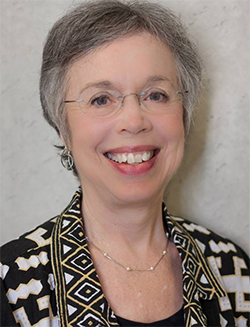Matthews recognized for 'the very strong example she sets'
The American Society for Biochemistry and Molecular Biology has chosen Kathleen S. Matthews at Rice University as the recipient of the William C. Rose Award for her groundbreaking biophysical and biochemical research on DNA-binding proteins, particularly Escherichia coli repressor proteins and the Hox protein Ultrabithorax from Drosophila melanogaster.
 " This honor is especially meaningful because it encompasses so many former students and colleagues, whose passion and diligence have shaped the direction of work in my laboratory. This recognition also reminds me of my gratitude for the special guides who nurtured my own scientific growth. Mentoring has been a constant joy and a deep source of energy and passion for the research endeavor in my life, and more has been learned from this process than was given!S" — KATHLEEN MATTHEWS
" This honor is especially meaningful because it encompasses so many former students and colleagues, whose passion and diligence have shaped the direction of work in my laboratory. This recognition also reminds me of my gratitude for the special guides who nurtured my own scientific growth. Mentoring has been a constant joy and a deep source of energy and passion for the research endeavor in my life, and more has been learned from this process than was given!S" — KATHLEEN MATTHEWSThe Rose award recognizes exceptional contributions to biochemical and molecular biological research as well as an investment in the training and education of young scientists.
“I feel strongly that (Matthews’) work over the past 40 years has established in textbook detail the molecular mechanisms for allosteric induction of the E. coli lac operon by sugar and DNA binding to LacI,” said John S. Olson of Rice University, who nominated Matthews for the award.
Matthews graduated from the University of Texas at Austin with a B.S. in chemistry in 1966 and earned her Ph.D. in biochemistry from the University of California, Berkeley, in 1970. She joined Rice University as a faculty member in 1972 and today is the Stewart Memorial professor there.
“Along the way, Kathy became interested in other bacterial repressors, eukaryotic transcription factors, Ubx and p53, and even proteins as materials, the studies of which … have provided reference points for her continuing understanding of lacrepressor,” explained Catherine Royer of Rensselaer Polytechnic Institute, who collaborated with Matthews as a graduate student at the University of Illinois.
In addition to her significant scientific contributions, the award recognizes Matthews’ outstanding mentorship to emerging scientists. She has supervised 33 Ph.D. students, 21 of whom were women or minorities, three female M.A. students, and more than 130 undergraduate students, more than half of whom were women or minorities. She has also won numerous universitywide teaching awards, including three esteemed George R. Brown awards for superior teaching.
Furthermore, Matthews helped found the National Science Foundation-sponsored ADVANCE program to increase the number of women and minorities at Rice University’s Schools of Natural Science and Engineering and to provide support and mentoring for new faculty members.
“I can attest to her total lack of selfishness, her openness and frankness, and the very strong example she sets for scientific quality and ethics,” Royer said.
Matthews has been a fellow of the American Association for the Advancement of Science since 1996 and served on the editorial board of the ASBMB’s Journal of Biological Chemistry from 1989 to 1994 and as an associate editor from 1994 to 1999. She led Rice University’s biochemistry and cell biology department from 1987 to 1995 and served as dean of its Wiess School of Natural Sciences from 1998 to 2009. Simultaneously, she helped found the Keck Center for Computational Biology and the Gulf Coast Consortia, which support many successful graduate-student and postdoctoral training and research programs in the larger Houston area.
Enjoy reading ASBMB Today?
Become a member to receive the print edition four times a year and the digital edition monthly.
Learn moreGet the latest from ASBMB Today
Enter your email address, and we’ll send you a weekly email with recent articles, interviews and more.
Latest in People
People highlights or most popular articles

The data that did not fit
Brent Stockwell’s perseverance and work on the small molecule erastin led to the identification of ferroptosis, a regulated form of cell death with implications for cancer, neurodegeneration and infection.

Building a career in nutrition across continents
Driven by past women in science, Kazi Sarjana Safain left Bangladesh and pursued a scientific career in the U.S.

Kiessling wins glycobiology award
She was honored by the Society for Glycobiology for her work on protein–glycan interactions.

2026 ASBMB election results
Meet the new Council members and Nominating Committee member.

Simcox wins SACNAS mentorship award
She was recognized for her sustained excellence in mentorship and was honored at SACNAS’ 2025 National Conference.

From humble beginnings to unlocking lysosomal secrets
Monther Abu–Remaileh will receive the ASBMB’s 2026 Walter A. Shaw Young Investigator Award in Lipid Research at the ASBMB Annual Meeting, March 7-10 in Washington, D.C.

